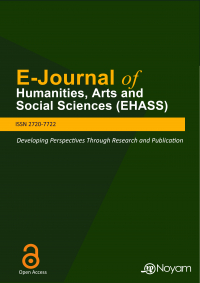
Genre Analysis of Chief Examiners’ Reports from Selected Colleges of Education in Ghana
Issue: Vol.3 No.4 April 2022 Article 3 pp. 115-129
DOI : https://doi.org/10.38159/ehass.2022343 | Published online 28th April, 2022.
© 2022 The Author(s). This is an open access article under the CCBY license (http://creativecommons.org/licenses/by/4.0/).
Although studies on genre abound in the Ghanaian literature, only a few have paid attention to the form and function of Chief Examiners’ Reports on the academic performance of candidates at examinations. To address this gap, the current study analyzes Chief Examiners’ Reports from selected Colleges of Education, covering several disciplines. The study adopts a qualitative descriptive design to examine movement patterns as well as the linguistic devices employed in such reports. Cast in Bhatia’s model of move analysis theory and Kanoksilapatham’s move criteria, the study shows that moves employed include both obligatory and optional ones: six (out of the ten) of the moves are obligatory while four are optional. Furthermore, the study found that most Chief Examiners’ Reports lack Introduction sections, and there appears to be no standard structure/format in Chief Examiners’ Reports. Regarding stance-taking devices, the study found that only three pronouns, it, they and this were used. It is recommended that Chief Examiners pay critical attention to the Introduction segments of their reports and that a standard format is provided to all Chief Examiners so as to achieve uniformity.
Keywords: Genres, Moves, Chief Examiners’ Report, English for Specific Purposes
Adjina, C. & Hadjadj, I., Academic Master Dissertation in ESP and Applied Linguistics, 2016. (Analysis of the Move Structure of Published Research Article Introductions Written by EFL Advanced Writers). Retrieved from: https://bu.univ-ouargla.dz/master/pdf/ADJINA-HADJADJ.pdf?idmemoire=3999
Afful, J., & Mwinlaaru, I., Commonality and individuality in academic writing: An analysis of conference paper titles of four scholars. English for Specific Purposes World, 27(1), (2010): 1- 32.
Aranha, S., Contribuições para a introdução acadêmica. Unpublished doctoral thesis dissertation, Paulista State University, Campus of Araraquara, São Paulo, Brazil (2004).
Atai, M.R., & Fallah, S., A contrastive genre analysis of results and discussion sections of applied linguistics articles written by native and non-native English speakers, 2005. In Shirani, S. & Chalak, A. (2018). Genre analysis of Iranian Students’ Master Theses. Australian International Academic Centre.www.alls.aiac.org.au Retrieved 20th March, 2020.
Bawarshi, A.S. & Mary Jo Reif, M.J., Genre: An Introduction to History, Theory, Research, and Pedagogy. West Lafayette, Indiana: Parlor Press, 2010, Best Assignment Writers (2000). Significance of report writing. UK: Best Writers. Retrieved: 20th March, 2020.
Bhatia, V.K., Analyzing genre: Language use in professional settings. London: Longman, 1993.
Bhatia, V.K. Genre-mixing in academic introductions. English for Specific Purposes 16(3), (1997): 181-195.
Bhatia, V.K., Worlds of written discourse: A Genre based view, London: Continuum, 2004.
Brett, P., A genre analysis of the results section of sociology articles. English for Specific Purposes, 13(1), (1994):47 -59.
British Standards Institution Presentation of research and development reports. London: BSI, 1972.
Haggan, M., Research paper titles in literature, linguistics and science: Dimensions of attraction. Journal of Pragmatics, 36(2), (2004): 293- 317.
Henry, A., & Roseberry R.L., A narrow-angled corpus analysis of moves and strategies of the genre: ‘Letter of Application’. English for Specific Purposes, 20(2), (2001): 153-167.
Holmes, R., Genre analysis and the social sciences: An investigation of the structure of research article discussion sections in three disciplines. English for Specific Purposes, 16(4), (1997): 321- 337.
Hopkins, A., & Dudley-Evans, T., A genre-based investigation of the discussion sections in articles and dissertations. English for Specific Purposes, 7(2), (1988): 113 – 121.
Hyland, K., Genre analysis: just another fad?”. Forum 30(2), (1992): 1 – 17.
Hyland, K., Disciplinary discourses: Social interactions in academic writing. London: Longman, 2000.
Flowerdew, J. & Dudley-Evans, T., Genre analysis of editorial letters to international journal contributors. Applied Linguistics, 23(4), (2002):463- 489.
Kanoksilapatham, B., Rhetorical structure of biochemistry research articles. English for Specific Purposes, 24(3), (2005): 269- 292.
Keshavarz, M.H., Atai, M.R. & Barzegar, V., A contrastive study of Generic organization of research article introductions written by Iranian and Non-Iranian writers in applied linguistics. Teaching English Language and Literature Society of Iran, 1(2), (2007):13- 34.
Lores, R., On RA abstracts: From rhetorical structure to thematic organisation. English for Specific Purposes, 23(3), (2004): 280-302.
Martin, P.M., A genre analysis of English and Spanish researcher paper abstracts in experimental social sciences. English for Specific Purposes, 22(1), (2003): 25- 43.
Martin, J.R., & Rose, D., Genre relations: Mapping culture. London: Equinox, 2007.
Nodoushan, M., & Khakbaz, N., Theses ‘Discussion’ sections. A structural move analysis. International Journal of English Studies, 5(3), (2011): 111- 132.
Nwogu, K.N., The Medical research paper: Structure and functions. English for Specific Purposes, 16(2), (1997): 119-138.
Posteguillao, S., The schematic structure of computer science research articles. English for Specific Purposes, 18(2), (1999): 139- 160.
Samraj, B., Introductions in research articles: Variations across disciplines. English for Specific Purpose. 21(1), (2002): 1-17.
Samraj, B,. An exploration of a genre set: Research article abstracts and introduction in two disciplines. English for Specific Purposes, 24(2), (2005): 141- 156.
Swales, J. M., Genre analysis: English in academic and research settings. Cambridge: Cambridge University Press, 1990.
Swales, J. & Freak, C., Academic writing for graduate students. Ann Arbor, MI: University of Michigan Press, 1994.
Thompson, D.K., Arguing for experimental “facts” in science. Written Communication, 10(1), (1993): 106- 128.
Thompson, P., Citation practices in PhD theses (2000). In: Singh, M.K.S., Shamsudin, S. & Y.H. Zaid (2013) “Iranian EFL learners’ collocational errors in speaking skill” Procedia-Social and Behavioral Sciences, 66, 370 – 379. Retrieved 20th April, 2020.
Upton, T., Understanding direct mail letters as a genre. International Journal of Corpus Linguistics, 7(1), (2002): 65- 85.
Williams, I., Results sections of Medical research articles: Analysis of rhetorical categories for pedagogical. English for Specific Purposes, 18(4), (1999): 347- 366.
Yang, R. & Allison, Ras in applied linguistics: Moving from results to conclusions, English for Specific Purposes, 4(22), (2003): 365- 384.
Mr. Henry Kwao Ayitey is an English Tutor in the Languages Department, Kibi Presbyterian College of Education, Ghana. He holds a Bachelor in Education in Primary Education (English), from the University of Cape Coast, Bachelor in Education in English, from Valley View University, Ghana, and Master’s Degree in Teaching English as a Second Language (TESL) from the University of Education, Winneba, Ghana. He is currently pursuing a Master of Philosophy (English Education) at the University of Cape Coast. His research focuses on English Methodology, Content, Language and Linguistics.
Obed Nii Broohm holds a PhD in Linguistics from the University of Verona, Italy, as well as MPhil/BA in Linguistics from the University of Ghana. His research interests lie in Morphological Theory, comparative Kwa morpho-syntax, Phonology and Language Documentation. He enjoys teaching, and researches on several aspects of Linguistics including Morphology and Morphological Theory, Phonology and Phonological Theory, Syntax-Phonology Interface, as well as language documentation. Dr. Broohm peer-reviews for a number of journals including the Journal of African Languages and Linguistics, Studies in African Linguisitcs, Journal of West African Languages, Nordic Journal of African Studies, Contemporary Journal of African Studies and Ghana Journal of Linguistics.
Gladys Mimmie Edjah (Mrs.) is with the Languages Department, St. Louis College of Education. She graduated from the University of Cape Coast in 1995 after which she taught English at OLA College of Education from 1996 to 2013. From 2013 to present, she joined the staff of St. Louis College of Education. She holds M. Ed Teacher Education in English, and currently pursuing Master of Philosophy, English Education, at the University of Cape Coast. She has been teaching English Methodology, Content, Language and Linguistics.
Ayitey H.K., Broohm O.N. & Edjah G.M., “Theological and Ethical Reflections on Care for Widows from an African Christian Perspective.” E-Journal of Humanities, Arts and Social Sciences 3, no.4 (2022):115-129 https://doi.org/10.38159/ehass.2022343
© 2022 The Author(s). Published and Maintained by Noyam Publishers. This is an open access article under the CCBY license (http://creativecommons.org/licenses/by/4.0/).
Others

